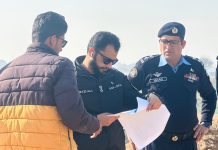By Minahil Makhdoom
ISLAMABAD: Resident Representative of Hanns Seidel Foundation (HSF) Pakistan Dr Steffen Kudella has said the Artificial Intelligence (AI) would change the world more than anything else due to its multi-dimensional impacts, including time efficiency and accuracy.
Speaking during a roundtable discussion “Technological Transformation in Pakistan : an Asset or Liability†here, he said, “The technological development is one of the greatest challenges of our future. Computers and robots are replacing more and more human jobs.†The discussion was jointly organized by the HSF and the Center for Global & Strategic Studies (CGSS).
Dr Steffen Kudella highlighted the negative impacts of the AI. “If this trend continues, it could lead to an unequal society in which a very small elite of ‘technical experts’ control the whole economy, and in which most humans become part of a huge unemployed mass.â€
At the same time, he shed light on the AI’s positivity, saying the technological development provided a lot of reason to hope as it had positive potential related to healthcare, traffic control etc. But the question arises, whom does technological development actually serve? Does it serve a tiny elite of people or does it serve all the people?†he concluded.
Taking part in the discussion, former information secretary and Senior Member Advisory Board of CGSS Ashfaq Ahmad Gondal said technological transformation had become a prerequisite for the development of a state. With the rapid developments in the field of science and technology along with increased digitalization across the globe, he said, the traditional sphere of various sectors in Pakistan such as economy, governance, market-customer relations, healthcare, education and even security had largely transformed.
“It is, therefore, imperative to analyze these developments, discuss the challenges and their possible solutions equally,†he added. Tariq Malik, former chief technology officer at GHQ, stated that the COVID-19 pandemic had accelerated change in the global economy. “This pandemic is hastening digitization. When work is carried out remotely, it does not matter where it is done.
Consumers’ switch from physical retail towards e-commerce has quickened. Health-care and education services have shifted online. The world will emerge from 2020 into an era of more intense great-power competition. The labour market will adjust to a world with less spending in cities and more in suburbs, and off shore – online.
“We must invest in new ideas, AgriTech, taxation, logistics, security and adopt digital technologies with built in security,†he stressed. Ammar Jaffri, Director General, Center of Information Technology (CIT), emphasized the need of having a bigger database to know who was doing what. The COVID-19, he said,†has done something that we could never have done and digital transformation has been taken to next level. Block chain is seen skeptically today. It is like stopping food or electricity if the block chain is stopped. We need to ponder collectively, individual planning and work is not enough. Our digital footprints should be all over Pakistan including every village.â€





